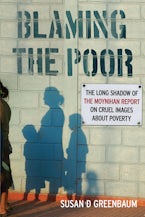"An intimate portrayal of social science researchers' and policy makers' roles in shaping perceptions of the poor in the US … By examining the ways in which the tangle of pathology thinking has shaped housing, criminal justice, and antipoverty programs, Greenbaum highlights that the real winners of these programs are the non-poor. She argues that dismantling racialized stereotypes of the poor and holding open discussions with those who experience poverty will lead to more sustainable solutions to poverty ... Essential. All academic levels/libraries."
(CHOICE) "Blaming the Poor is a thorough examination of the anti-poverty trend that began with 'the thesis that broken families cause poverty' and continues fifty years later to demonize poor African Americans."
(Contemporary Sociology) "Wonderfully engaging ... Susan Greenbaum has written an important book, which deserves a wide audience among both practitioners and academics."
(Journal of Urban Affairs) "[Blaming the Poor] is an exceptional challenge to common conservative opinions of poverty… Politicians and policymakers of all backgrounds and political stances should read this book."
(Poverty & Public Policy) "Greenbaum's text offers an accessible review of approaches to poverty in the second half of the twentieth century that can help educate students of all kinds about how we ended up in the mess we find ourselves in today."
(H-Citizenship) "A fascinating synthesis of existing scholarship on poverty and policy that draws on Greenbaum's fieldwork to extend the existing literature in helpful and provocative ways."
(North American Dialogue) "Greenbaum's powerful and important book provides valuable and little-known context for the Moynihan Report. She traces the ideas in that report as they were adopted and challenged over time."
- Brett Williams (American University) "I applaud Susan Greenbaum's timely book, with its sober reasoning, scrupulous scholarship, theoretical acumen, lucid prose, and penetrating and spirited critique of mainstream perspectives on poverty."
- Stephen Steinberg (Queens College and the Graduate Center, City University of New York)

